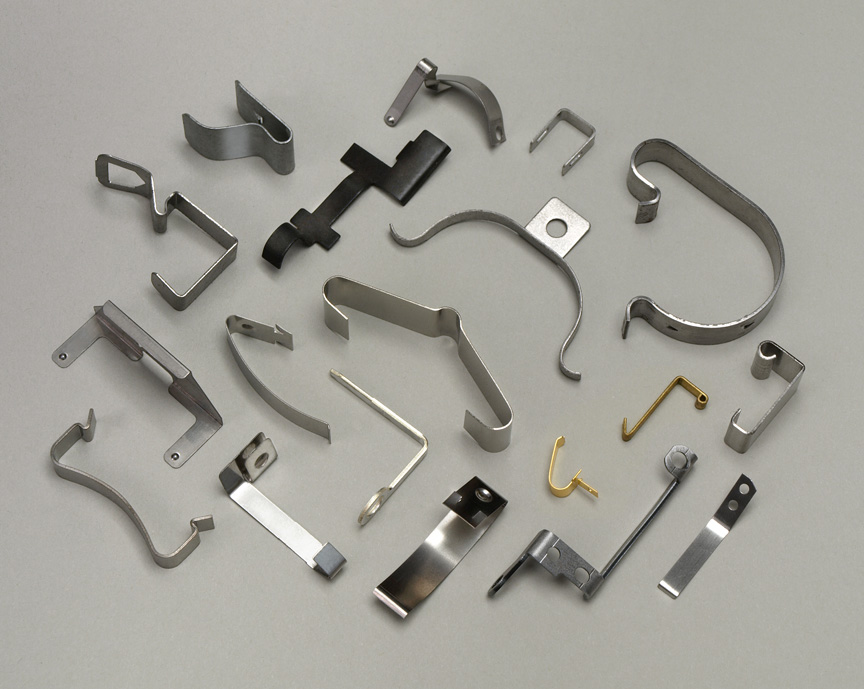Stainless Steel Stampings
Atlantic Precision Spring manufactures precise stainless steel stampings. There are hundreds of different types of stainless steel, all available in various grades and tempers. Each type of stainless steel reacts differently when formed, drawn or extruded.
Stainless steel, one of the most common metals used at Atlantic Precision Spring, boasts a number of great properties. Mainly, it’s used for applications because it does not require a finish to prevent oxidation, tarnish, or rust. It also has a great exterior look for improved aesthetics. Not to mention, it’s strong and durable.
With more than 50 years of experience, Atlantic Precision Spring has reduced lead times and costs for our customers by choosing the best steel and getting the items produced and out the door efficiently.
Stainless Steel Is Broken Down Into Different Types:
Austenitics
Austenitic stainless steel is the most common type, including 200 series and 300 series. This is because of its low cost and great resistance to corrosion. Types 304 and 316 appear most often throughout a wide range of applications in the automotive and marine fields.
Duplex
Duplex stainless steel is a combination microstructure of both austenite and ferrite. This draws benefits from the two, increasing the strength and ductility. A common type is Zeron 100, which was developed by Rolled Alloys. Other common grades are UNS S32101 (LDX 2101), S32304, and S3200. The most widely used grade is UNS S31803/S32205 – more commonly known as 2205. Industries that use duplex steels include oil and gas, and various chemical fields and mining.
Ferritic & Martensitic
Ferritic stainless steel and Martensitic stainless steel are both part of the 400 series stainless steel family. The difference between the two is that ferritic is non-heat treatable. The advantage of martensitic stainless steel is that it can be formed, drawn, milled, or tapped and then hardened while maintaining its corrosion resistance.[/toggle]
Precipitation-Hardening
Precipitation-Hardening stainless steel, also known as (PH), is generally in the 600 series. Popular grades include 15-5, 17-4, 17-7, Nitronic 50 and Nitronic 60. These types are widely used in the aircraft industry because of the ability to heat treat and create a high-strength material.
Atlantic Precision Spring has the capability of producing prototypes and short runs of all stainless steel metal stamping in just a few days to ensure customer satisfaction prior to large-volume production. Our process for rapid prototyping is optimized to produce precision components with a quick turnaround. The prototypes can be blanked by laser, wire EDM or stamped in a simple die prior to forming, drawing, tapping or coining.
Stainless Steel Stamping FAQs
What Is Stainless Steel Good For?
Stainless steel is a great manufacturing option because it does not require a finish to prevent oxidation, tarnish, or rust. It is very strong and durable, and also is appealing to the eye!
Are There Different Types of Stainless Steel?
There are four types of stainless steel: austenitic, duplex, ferritic, martensitic, and precipitation-hardening.
What Is Austenitic Stainless Steel?
It is the most common type, including the 200 series and 300 series. This is because of its low cost and great resistance to corrosion.
What Is Duplex Stainless Steel?
Duplex is the second type of stainless steel and is a combination of austenite and ferrite. There is an increase in strength and ductility.
What Are Ferritic and Martensitic Stainless Steel?
They are both parts of the 400 series stainless steel family. The difference between the two is that ferritic is non-heat-treatable. The advantage of martensitic stainless steel is that it can be formed, drawn, milled, or trapped and then hardened while maintaining its corrosion resistance.
What Is Precipitation-Hardening Stainless Steel?
Precipitation-hardening stainless steel is most often used in the aircraft industry because of its ability to heat treat and create a high-strength material. The most popular are generally 15-5, 17-4, 17-7, Nitronic 50, and Nitronic 60.

